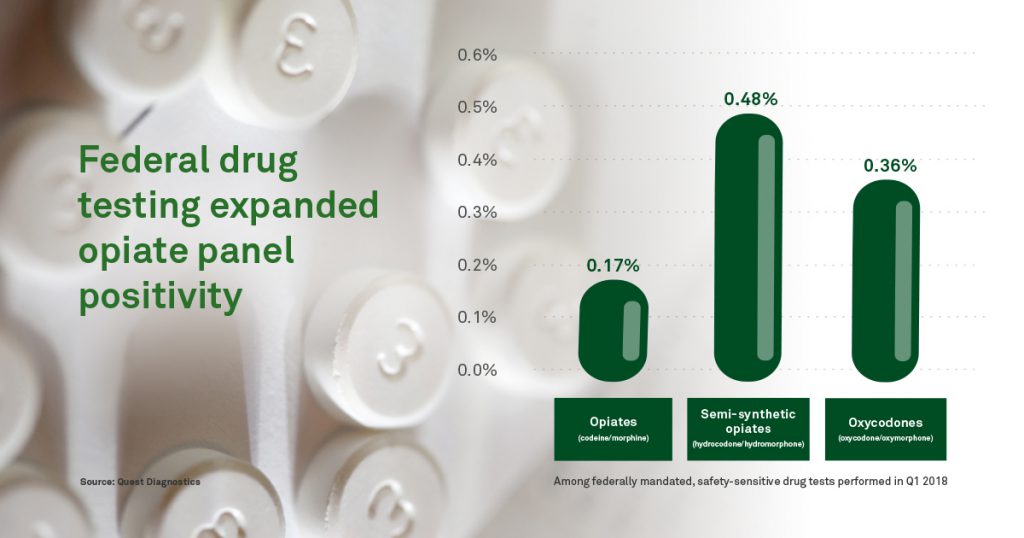 On January 1, 2018, the U.S. Department of Transportation (DOT) added four new opiates (“opioids”) to its drug testing program: hydrocodone, hydromorphone, oxycodone, and oxymorphone. Prior to this change, the only opiates included in the test were codeine, morphine, and 6-acetylmorphine (6-AM). This more robust testing panel was implemented to update and align the panel with broader prescription opiate drug use and misuse patterns, thereby helping employers in the federally mandated, safety-sensitive sector to better identify workers who may negatively impact transportation safety.
On January 1, 2018, the U.S. Department of Transportation (DOT) added four new opiates (“opioids”) to its drug testing program: hydrocodone, hydromorphone, oxycodone, and oxymorphone. Prior to this change, the only opiates included in the test were codeine, morphine, and 6-acetylmorphine (6-AM). This more robust testing panel was implemented to update and align the panel with broader prescription opiate drug use and misuse patterns, thereby helping employers in the federally mandated, safety-sensitive sector to better identify workers who may negatively impact transportation safety.
Quest Diagnostics Drug Testing Index™ data shows that for the past five years, opiate (codeine and morphine) positivity among this workforce hovered between 0.17 and 0.21%. In the first quarter of 2018, this positivity rate held steady. Over the same period, positivity for the recently added opiates was notably higher than the rate we observed among the traditional opiates.
“We fully expected to have more laboratory positives. And, I would expect there will be more Medical Review Officer positives as well. There will be additional specimens that screen positive that in the past would have confirmed negative,” said Barry Sample, Ph.D., Senior Director of Science and Technology at Quest.
While some opiate use is certainly legitimate based on a physician’s prescription, it’s also clear that these drugs present an opportunity for improper use and abuse. The dangers and risks associated with this type of drug use are likely elevated based on a testing population that includes truck and train drivers, airline pilots, and other safety-sensitive roles.
“It will be important to observe the long-term positivity trend as it relates to these prescription drugs among this testing population. This additional data will enable employers in the safety-sensitive sector to monitor, better identify, and provide appropriate treatment to individuals identified as misusing these drugs, as their rampant use continues to raise public safety concerns, said Kim Samano, Ph.D., Scientific Director at Quest.”
If your organization is interested in starting a drug testing program, expanding your existing panel, or learning more about the testing services offered by Quest Diagnostics, please contact one of our sales representatives.
Download our drug testing guide.
For more information about drug testing, visit our website.
 Your Privacy Choices
|
Privacy Notices
|
Terms
|
Language Assistance / Non-Discrimination Notice | Asistencia de Idiomas / Aviso de no Discriminación | 語言協助 / 不䈚視通知
Your Privacy Choices
|
Privacy Notices
|
Terms
|
Language Assistance / Non-Discrimination Notice | Asistencia de Idiomas / Aviso de no Discriminación | 語言協助 / 不䈚視通知
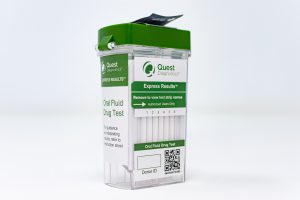

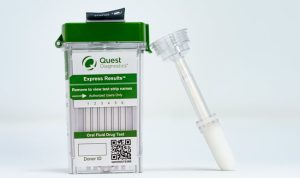




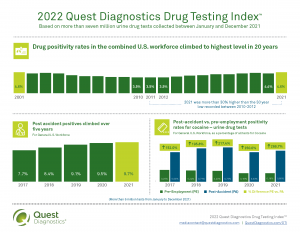


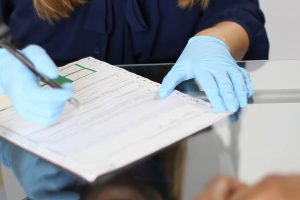



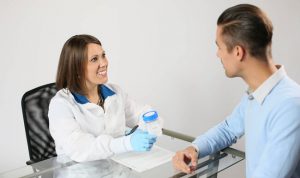




Quest Diagnostics Drug Testing Index™ data shows that for the past five years, opiate (codeine and morphine) positivity among this workforce hovered between 0.17 and 0.21%. In the first quarter of 2018, this positivity rate held steady. Over the same period, positivity for the recently added opiates was notably higher than the rate we observed among the traditional opiates.
“We fully expected to have more laboratory positives. And, I would expect there will be more Medical Review Officer positives as well. There will be additional specimens that screen positive that in the past would have confirmed negative,” said Barry Sample, Ph.D., Senior Director of Science and Technology at Quest.
While some opiate use is certainly legitimate based on a physician’s prescription, it’s also clear that these drugs present an opportunity for improper use and abuse. The dangers and risks associated with this type of drug use are likely elevated based on a testing population that includes truck and train drivers, airline pilots, and other safety-sensitive roles.
“It will be important to observe the long-term positivity trend as it relates to these prescription drugs among this testing population. This additional data will enable employers in the safety-sensitive sector to monitor, better identify, and provide appropriate treatment to individuals identified as misusing these drugs, as their rampant use continues to raise public safety concerns, said Kim Samano, Ph.D., Scientific Director at Quest.”
If your organization is interested in starting a drug testing program, expanding your existing panel, or learning more about the testing services offered by Quest Diagnostics, please contact one of our sales representatives.
Download our drug testing guide.
For more information about drug testing, visit our website.